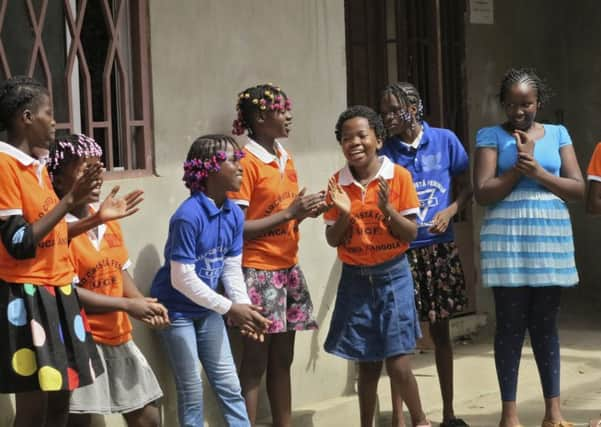Sian Curry: The country where girls are trained to do what men tell them


In the airy courtyard of an unfinished breezeblock building, voices are raised and braids are flying. A circle of girls are singing and dancing, taking turns to step into the centre to perform, while their friends cheer them on.
It’s a captivating display. Some girls are in their element, relishing the opportunity to take centre stage. Others, like 15-year-old Brígida, are a little more nervous. But all find their voice in the end.
Advertisement
Hide AdAdvertisement
Hide AdBrígida and her friends live in Cazenga, a particularly poor and crowded suburb of Angola’s capital city, Luanda. It’s a tough neighbourhood to grow up in, but Brígida still stands every chance of building a brighter future, because of the simple fact that she still goes to school.
In Angola, this puts her in a minority. Less than a quarter of girls of secondary-school age are still in the classroom. There are many reasons why so few teenage girls stay in school, but one of the major factors is motherhood.
“Underage sex and pregnancy is the biggest danger for young girls here,” explains Benedita Fuani, 23, who also grew up in Cazenga, and is now a mentor at the Girls Building Bridges project there.
The dancing girls above are all current students with the project, which is run by Christian Aid’s local partner organisation, the Christian Women’s Union (UCF). It works intensively with girls aged 10-17 to reduce early marriage, early pregnancy, and domestic violence, and to support girls to stay and thrive at school.
Angola’s teenage pregnancy rate is among the highest in the world. Over a third of 15-19-year-olds are already mothers, and 30 per cent of girls marry before they turn 18. Early marriage or motherhood usually marks the end of a girl’s education – at great cost to her own prospects and those of her children.
Benedita knows the value of the project’s work first hand – she attended it herself as a teenager. Today, she is at university, studying to become a clinical analyst. Benedita credits the project with steering her safely through her teenage years and improving her performance at school.
“I could have had a lot of difficulties if it weren’t for UCF, because of a lack of knowledge,” she explains. “There were things we didn’t discuss at home, and also not at school, they were taboo. But there we spoke about them.”
Like many Angolan girls, Benedita grew up in a household where sex wasn’t ever discussed. “It isn’t considered proper,” she explains. But silence leaves teenage girls dangerously uninformed, increasing their risk of early pregnancy and HIV.
Advertisement
Hide AdAdvertisement
Hide AdAt the Girls Building Bridges project, puberty, sex and healthy relationships are all openly discussed, as part of a comprehensive life skills programme. The course also focuses on developing girls’ assertiveness and public speaking skills.
Many Angolan girls have been trained from infancy to be quiet and do as they are told – especially when instructed by a man. “It’s in our culture – the man is the ‘cockerel’, he’s the one who speaks,” explains Benedita.
So encouraging girls to speak up – and especially to dare to say no sometimes – is no easy task. But when girls are able to be articulate and assertive, they can achieve much more in their schools and future workplaces. And it helps to keep them safe.
Christian Aid’s support is helping girls develop the confidence to put their hand up in lessons and join in class discussions, while also empowering them to decline unwanted sexual advances and stand up for themselves if someone treats them badly.
And when they are comfortable speaking in public, these girls can make waves. By spreading the word that girls should be schoolgirls first and mothers later, the girls themselves can transform attitudes and behaviour throughout their community.
This is what the song and dance session is all about. In classroom presentations and performance activities, the girls repeatedly practice speaking or performing in public, gradually building up the skills and confidence they need to hold their own at school, in their personal relationships and in their efforts to bring about wider change.
Brígida’s shyness used to hold her back. But not anymore. “The programme has helped me to be braver and speak in public,” she explains. “I speak up in school and I answer the teachers. I used to be embarrassed to ask teachers questions, but now I’m not. It’s helped me a lot in school.”
But the programme’s impact hasn’t been confined to the classroom. Brígida recently organised and hosted a public meeting in her own backyard, inviting schoolmates and neighbours to come along.
Advertisement
Hide AdAdvertisement
Hide AdThere she gave a compelling presentation on teenage pregnancy. The parents of all ten girls who attended were so impressed that they’ve signed their daughters up for the next Girls Building Bridges course. And so begins a chain reaction.
In a culture which often demands that girls should be seen and not heard, Brígida’s is a groundbreaking voice for change. And in a country where teenage mothers may outnumber teenage schoolgirls, her message couldn’t be more important.
Christian Aid has supported the Girls Building Bridges project for over a decade. In 2018, this work is generously funded by Irish Aid and the Presbyterian Church Ireland.
